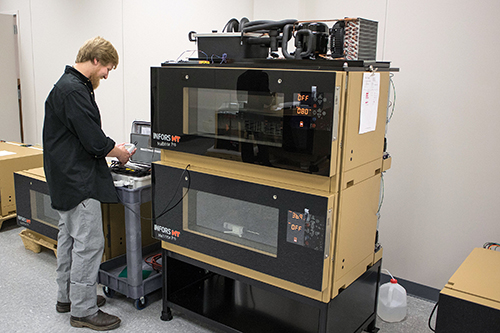March 15, 2017 (Vol. 37, No. 6)
Operations Include U.S. Development, Sales, Manufacturing, Testing, and Quality Assurance
Last month, Switzerland-based Infors opened its U.S. headquarters in Annapolis Junction, MD. The new 27,000-square-foot facility houses corporate offices, sales & marketing, service, engineering, and all U.S.-based product manufacturing activities.
GEN interviewed the CEO for Infors USA, Peter Tunon, who will lead the continued expansion of the brand in the U.S.
GEN: What were the primary reasons that drove the decision to open a new U.S. headquarters facility?
Mr. Tunon: Our business has almost tripled since we started the U.S. subsidiary in 2014. We simply outgrew the old facility. It quickly became too small to allow for proper material flow, manufacturing capacity, and administration.
GEN: Why was Annapolis Junction, Maryland, chosen as the site?
Mr. Tunon: There are good reasons to pick Annapolis Junction for a business of this nature. To start with, our new location is in a newly developed industrial area with excellent infrastructure, and in close proximity of three major airports (Dulles, National, and Baltimore). In addition, we are within easy driving distance to a large number of our East Coast customers in Maryland, Pennsylvania, and New Jersey.
GEN: What kinds of functions will take place in the new facility?
Mr. Tunon: Infors’ U.S. headquarters, administration, customer service, and technical support are all based here. The new facility will handle U.S. development, manufacturing, testing, quality assurance, and sales.
GEN: What kinds of products will be manufactured at the new facility?
Mr. Tunon: We manufacture incubated shakers, including the Multitron and Minitron product lines, and accessories for them. Our production is primarily geared for the North American market. Our bioreactors and fermenters are still manufactured at Infors’ main facility in Basel, Switzerland. As demand for those products grows, we will also start manufacturing them here in the U.S.

Quality assurance manager Travis Scagliarini performs one of his duties at Infors USA’s new 27,000-square-foot facility in Annapolis Junction, MD. He is shown here testing an incubation shaker, an Infors HT Multitron Pro. Each unit is “burned in” for over 100 hours and checked before it is shipped.
GEN: Based on these products, for what applications are you offering biomanufacturing solutions?
Mr. Tunon: We address all fields of cell culture and microbial applications, with sophisticated solutions for screening, process development, scaleup to pilot-scale and small-scale production up to 1,000 L. Our solutions are mainly used in biotechnological, biological, and medical research, as well as production of biological drugs. We are also providing customized solutions for specialized cultivation applications, e.g., biofuel research with algae or solid-state fermentation. Bioprocess software is another important part of our core business.
GEN: What types of bioprocess software to you offer?
Mr. Tunon: The bioprocess platform software eve® unifies bioprocess equipment—manufacturer independent. eve has been designed to handle big data in bioprocessing and helps in planning, controlling, evaluating, and presenting bioprocesses in a very user-friendly way.
Customer involvement and usability have been key during the development and beta testing of eve, and the U.S. market has had great influence. eve has been distributed and supported in the U.S. market from the beginning through our experts in the U.S.
With our new package, “User Management & Reporting,” eve now offers a clever user-management system that allows tracking and documenting all bioprocess-related activities. It is also possible to generate detailed reports from experiments at the touch of a button and export them in various formats, even in ready-to-use PowerPoint presentations.
GEN: How will the U.S. facility interact with the company headquarters in Basel?
Mr. Tunon: We are largely independent. Product development is done in close collaboration with the Swiss facility, and Switzerland supplies some core components that are more efficiently made in one location. Other than that, all components are locally sourced, with the vast majority of our parts made and assembled right here in Maryland.



